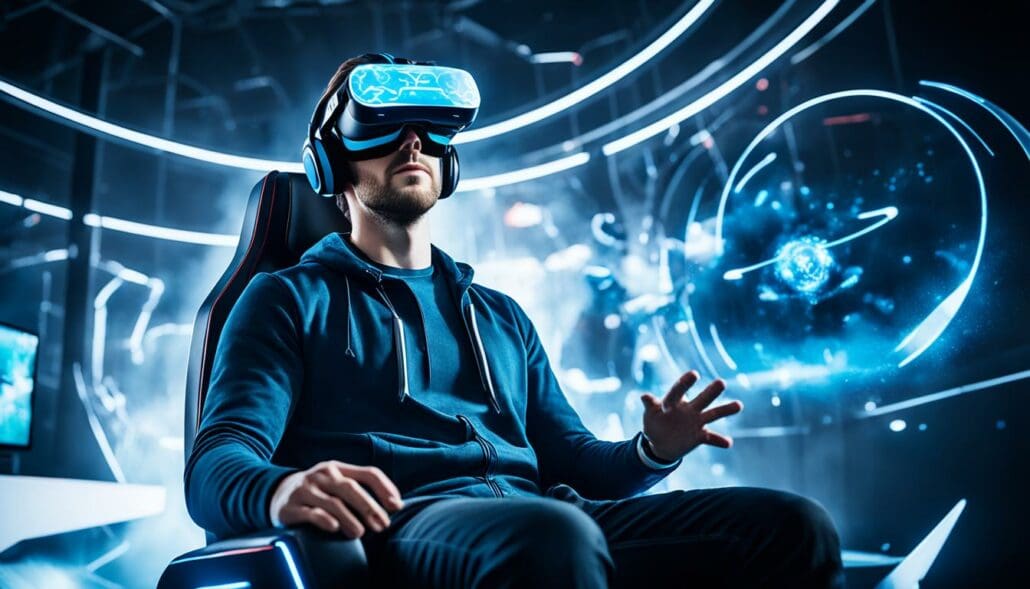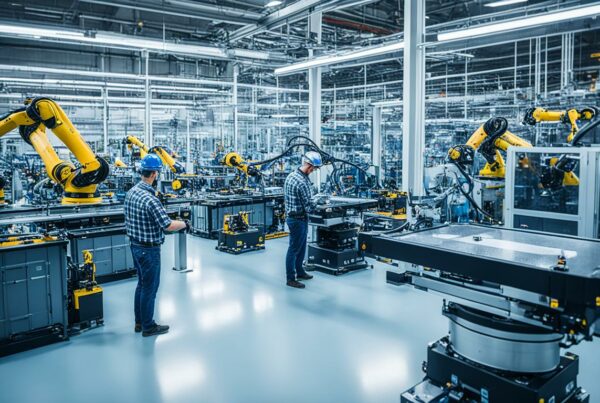Imagine a world where intelligence weaves through the very fabric of daily routines, encapsulating efficiencies we never thought possible. The surge in using AI in everyday life is not a far-off concept of science fiction but an unfolding reality. Intertwined within the tapestries of our lives, AI technology is the silent partner in an orchestrated dance of convenience and innovation. From the mundanities of scheduling to the complexities of health management, AI integration in daily life is opening us to a spectrum of unprecedented possibilities.
Often dismissed as a tool for the tech-savvy, artificial intelligence applications are quietly stitching themselves into the threads of the ordinary, catalysing a seamless flow of tasks. This invisible force in the background, ever-learning and adapting, moulds itself to fit each unique lifestyle, ingraining AI for efficient daily living into the culture of the mainstream. But what does this mean for the average person? How has the silent rise of AI shifted the narrative of what is regarded as ‘everyday’?
As we traverse the landscape of a rapidly evolving society, the adoption of AI stands as a testament to our relentless pursuit of advancement. A question lingers, however: Have we recognised the full potential AI holds in enriching the minutiae of our existence, or are we merely scratching the surface?
Key Takeaways
- The ever-growing presence of AI is reshaping the convenience in our personal and professional lives.
- Smart personal assistants, powered by AI, are becoming more integrated into daily routines, enhancing productivity.
- Artificial intelligence applications are making significant strides in various industries such as healthcare, home automation, and beyond.
- AI’s adaptability and learning capabilities facilitate personalised and efficient experiences in everyday tasks.
- Understanding and embracing AI technology could lead to a future where intelligent assistance is the norm in everyday living.
Unveiling AI’s Role in Modern Home Convenience
The integration of Artificial Intelligence (AI) into household environments is ushering in the era of smart homes, where home automation and connected living are not futuristic concepts but tangible realities improving everyday life. With AI functioning as the central nervous system of modern residences, customised preferences are no longer a luxury—they are an expected standard in the domestic realm.
In these intelligent habitats, incorporating AI in everyday tasks allows residents to experience unparalleled ease through devices that learn and adjust to their lifestyles. Envisage the scene: an individual enters their house after a long day, and the atmosphere is already attuned to their ideal relaxation setting – the lights are dimmed, the temperature is soothing, all achieved without lifting a finger, thanks to the silent toils of home automation.
Moreover, energy efficiency goes hand in hand with the comfort provided, proving that AI integrations benefit not only homeowners but also the environment. By analysing consumption patterns and adjusting usage accordingly, AI in smart homes demonstrates conscientious living where conserving energy becomes an automatic, rather than manual, practice.
- Smart Thermostats: AI’s Role in Climate Control
- Connected Security Systems: Safeguarding Homes Intelligently
- Voice-Activated Appliances: The Ease of Voice Command
| AI-Enabled Device | Primary Function | Benefits to Users |
|---|---|---|
| Smart Thermostats | Automated Temperature Regulation | Reduced Energy Bills, Comfort Optimisation |
| Intelligent Security Systems | Automated Monitoring and Alerts | Enhanced Security, Peace of Mind |
| Voice-Controlled Appliances | Hands-Free Operation | Convenience, Accessibility, Time-Saving |
It’s this ability to unify various components of domestic life into a seamless, interactive experience that encapsulates the wonders of AI—transforming the notion of ‘house’ into ‘home’—a sanctuary moulded by personal predilections and operating in perpetual anticipation of its owner’s needs.
As these innovations continue to proliferate, it becomes evident that the envisionment of a future where our living spaces not only understand us but also respond with intelligence and proactivity is not distant; it is the present-day achievement of a technology-infused lifestyle, harmoniously blending the wonders of AI with the comfort of home.
Revolutionising Healthcare with AI Innovations
The integration of artificial intelligence (AI) into the healthcare sector is dramatically transforming the landscape. From intricate surgery to robust healthtech, AI’s applications are multi-faceted, profoundly impacting medical diagnosis and personalised medicine. These developments are not only enhancing healthcare with AI but are also setting new benchmarks in the industry.
AI in Early Disease Detection and Diagnosis
AI algorithms have the unparalleled ability to process large quantities of data swiftly, thereby enabling early disease detection with greater accuracy. Image recognition technology, powered by advanced machine learning, analyses scans and radiographs, identifying patterns imperceptible to the human eye. This proactive approach significantly shortens the time to diagnosis, which is crucial for treating many conditions effectively.
Personalised Treatment through Machine Learning
Personalised medicine, an ambitious goal within traditional healthcare models, has become a tangible reality thanks to AI. By sifting through vast datasets including genetic information, AI helps craft tailored treatment protocols for individuals. This approach ensures that patients receive the most effective therapies based on their unique biological makeup, greatly improving the likelihood of positive health outcomes.
Enhanced Patient Care with Predictive Analytics
Predictive analytics exemplify AI impacts on health by forecasting possible patient trajectories. This facet of AI in healthcare empowers medical professionals with insights into potential future events, such as the risk of readmission or possible complications. Consequently, healthcare providers can make informed decisions, leading to enhanced patient care and optimised treatment strategies.
| Healthcare Aspect | Traditional Approach | AI-Enhanced Approach |
|---|---|---|
| Disease Detection | Manual image review | Automated pattern recognition |
| Treatment Personalisation | One-size-fits-all protocols | Genetic data-driven custom therapies |
| Patient Care | Reactive approaches | Proactive, predictive analytics |
Intelligent Transportation: Driving Forward with AI
The landscape of transportation is undergoing a significant transformation, orchestrated by the advancements in artificial intelligence. As we step into an era of intelligent systems shaping our commute, the melding of AI with transport technology is paving the way for a smart transportation ecosystem centred on efficiency, safety, and sustainability.
Autonomous Vehicles: The Journey towards Safety and Efficiency
Autonomous vehicles represent the vanguard of this transformation. These self-driving marvels are redefining the parameters of road safety and transport efficiency. Marrying sophisticated AI solutions for daily routines with state-of-the-art sensors and software, autonomous vehicles are poised to diminish human error—currently the leading cause of traffic incidents—ushering in a new age of commuter welfare and traffic optimisation.
AI-Powered Traffic Management Systems
Traffic management is witnessing a revolution through the employment of AI technologies. AI-driven systems collect and analyse real-time data to manage traffic flows, making congestion a thing of the past. This intelligent approach to traffic control not only improves the daily commutes of millions but also contributes to significant reductions in vehicle emissions, aligning with broader environmental objectives.
Revamping Logistics with AI Analytics
The logistics sector is another benefactor of the AI evolution, where the deployment of advanced analytics leads to unparalleled efficiency gains. The predictive power of AI streamlines route planning, anticipates delivery hurdles, and manages inventory with a precision previously unimaginable. It evidences the impactful role AI plays in the seamless orchestration of the daily movement of goods.
Using AI in Everyday Life: Personal Assistants and Beyond
The integration of AI in daily activities extends far beyond traditional boundaries, leading to the development of innovative smart personal assistants. Such virtual assistants have revolutionised mundane tasks, enabling users to focus on their core priorities. By utilising AI technology, these assistants have not only simplified task management but have also enhanced the quality of life for many. Let’s delve into how AI has infiltrated our daily routines and brought forth unprecedented convenience and efficiency.
Virtual assistants, such as Google Assistant, Alexa, and Siri, have set a remarkable standard in the realm of digital assistance. They interpret user needs with exceptional accuracy, offering both reactive and proactive support. From setting alarms and managing appointments to providing real-time weather updates and traffic information, these assistants have become integral to the management of personal schedules. Here’s a glimpse of the imperative roles these AI technologies play in our lives:
- Scheduling and reminders: Simplifying the organisation of calendars.
- Home automation: Controlling smart home devices with ease.
- Entertainment: Curating music and streaming content.
- Communication facilitation: Sending messages and making calls hands-free.
- Information sourcing: Answering queries with swift internet searches.
- Navigation assistance: Offering the best routes and travel options.
“With AI, the notion of a personal assistant has been recalibrated; it’s not merely a service but a lifestyle enhancement.” – A tech industry expert on the transformation of personal assistants with AI.
Embracing using AI technology in personal assistants has also opened avenues for tailored experiences. AI assistants are learning from user interactions and sculpting their functionalities to better suit individual preferences. The convenience they provide in streamlining daily operations is immeasurable, thus underscoring the significance of AI in enhancing life’s quality.
Forward-thinking companies are continuously refining their AI algorithms to understand context and nuance better. With every update, these assistants grow more intuitive, weaving seamlessly into the fabric of our everyday existence. As we look towards the future, the line between human and artificial intelligence blurs, paving the way for a more connected and intelligent world where virtual assistance is just the tip of the iceberg.
In conclusion, the benefits of using AI technology in the form of virtual aides have already made a notable impact, and this is merely the beginning. With ongoing advancements, smart personal assistants will continue to evolve, becoming even more entrenched in our daily lives. The symbiosis of human and AI holds potential for further liberation from routine tasks, creating a future where technology serves humanity with a sophistication previously only imagined.
Customising Education: The AI-Powered Approach
The realm of EdTech is rapidly embracing the benefits of AI in education, heralding a new era of personalised learning and adaptive education. As technology intertwines with instructional methods, it crafts a more tailored educational experience, laying the groundwork for students to achieve their full potential.
Educational professionals are now leveraging AI to analyse and respond to individual learning preferences, thereby offering a curriculum that dynamically adapts to each student. This AI-powered personalisation not only fosters a deeper engagement with the material but also promotes a self-directed pace of learning that’s conducive to long-term academic success.
- AI in EdTech identifies patterns, enabling targeted learning strategies.
- Customised content delivery elevates engagement and retention rates.
- Real-time feedback and assessments from AI help modify learning paths.
- Adaptive learning platforms foster a more inclusive learning environment.
The strides in adaptive education are not simply conceptual; they reflect a palpable shift in how educational content is delivered and received. This AI-centric approach has surmounted traditional barriers, offering students a truly individualised learning journey that was once a mere aspiration.
A child’s education is the cornerstone of their future, and with AI, we have the tools to make every corner sturdy and every block perfectly in place. – a leading EdTech expert.
In summary, the integration of AI into educational systems stands as a testament to the profound impact that personalised and adaptive learning techniques have on the educational landscape. The fusion of artificial intelligence with traditional pedagogy is not just a fleeting trend; it is the bedrock upon which the future of education will be built.
Smarter Economies: AI’s Impact on Finance and Commerce
The advent of AI in finance is transforming the industry by injecting unprecedented levels of efficiency and personalisation. From detecting fraudulent activities to customising user experiences in e-commerce, AI’s influence is deeply entrenched in the mechanisms that drive modern economies. Moreover, AI analytics in commerce have become indispensable for companies looking to glean insights and stay competitive. In this globally connected financial environment, AI’s ability to swiftly analyse and process colossal datasets plays a pivotal role in decision-making processes.

Fraud Detection: The Algorithmic Sentinel
Amongst AI’s most lauded contributions to finance is its ability to serve as an algorithmic sentinel against fraud. Fraud detection with AI is not just about recognising patterns that deviate from the norm; it’s about learning and evolving with each transaction. By continuously improving its detection capabilities, AI ensures that financial institutions and their customers are safeguarded against a spectrum of fraudulent activities.
AI-Driven Personalisation in E-commerce
The narrative of retail has been rewritten with the introduction of e-commerce personalisation, fuelled by AI. By analysing browsing history, purchase patterns, and customer preferences, AI crafts a tailored shopping experience that heightens customer satisfaction and loyalty. This intelligent personalisation leads to a more dynamic shopping experience, resonating with consumers who now expect a certain degree of intuitive understanding from online platforms.
Algorithmic Trading and Market Analysis
Furthermore, AI has significantly democratized financial markets through algorithmic trading. Traders, backed by AI’s computational power, can foresee market trends and make informed decisions at speeds beyond human capabilities. This shift is not merely about speed but precision; AI-driven market analysis permits a meticulous examination of market conditions, ensuring investments are more calculated and strategic.
The reach of AI in finance and commerce extends beyond these applications; however, the mentioned are clear indications of AI’s transformative potential. For businesses and individuals alike, embracing AI means staying ahead in a swiftly evolving economic landscape.
AI and The Quest for Environmental Sustainability
In the current epoch where technological innovation is of paramount importance, AI solutions for sustainability emerge as a beacon of hope against the scourge of climate change. Artificial intelligence stands as a pivotal force in our endeavour to reconcile human progress with ecological harmony.
Data-Driven Solutions to Climate Challenges
As nations grapple with the far-reaching impacts of climate change, AI steps onto the global stage as an invaluable ally. AI’s sophisticated analytical prowess aids in decoding vast arrays of environmental data, unveiling patterns that escape the human eye. By forecasting climatic shifts with uncanny accuracy, artificial intelligence empowers policymakers to take pre-emptive actions, potentially averting disaster.
Optimising Energy Use with AI Innovations
Efficient energy management with AI has started to revolutionise our approach to power consumption. AI’s capacity to predict and adjust to energy demands in real-time champions a reduction in waste, forging the path to a sustainable future with lower carbon footprints.
Example Table of AI Energy Management Innovations and their Impacts
| AI Innovation | Energy Saving Potential | Implementation Example |
|---|---|---|
| Smart Grid Technology | Up to 20% reduction in energy waste | Dynamic pricing models in electricity distribution |
| AI-Powered HVAC Systems | Up to 10% improvement in heating efficiency | Learning thermostats in commercial buildings |
| Automated Energy Audits | Insight into potential savings of up to 30% | Data-driven retrofit suggestions in manufacturing plants |
These strategic deployments of AI not only represent a leap forward in energy management but also echo the indispensable role of innovative AI solutions in surmounting the hurdles posed by climate change.
Entertainment Tailored by AI: A New Era of Personalisation
The landscape of AI in entertainment is being transformed by the advent of innovative technology that offers an unparalleled degree of content personalisation with AI. Streaming giants and video game developers are at the forefront, leveraging the insights provided by AI to customise experiences that cater to individual preferences, ensuring that the content we consume is more relevant than ever before.

AI’s impact is particularly evident within the realm of interactive media, where AI technology in gaming is crafting dynamic narratives that respond to the player’s style and decisions. Content creators are also exploring new frontiers in storytelling, where AI-driven analytics enable the delivery of stories and music that enrich the user experience by aligning with their past interactions.
| AI Feature | Benefits in Entertainment | Real-World Application |
|---|---|---|
| Machine Learning Algorithms | Curate watchlists based on viewing history | Netflix’s recommendation engine |
| Interactive Storytelling | Games adapt to player choices, offering a unique experience | Role-playing games like The Witcher series |
| Natural Language Processing | Virtual assistants understand and execute specific entertainment requests | Amazon Alexa’s voice commands for music and TV shows |
| Content Analysis | Enhances discoverability of niche genres and creators | Spotify’s Discover Weekly playlists |
This tailored approach not only enhances engagement by providing users with more of what they love but also opens doors for discovering new genres and creators that might have otherwise gone unnoticed. The future of entertainment is one where AI not only understands our preferences but also anticipates our desires, creating an ecosystem that is both innovative and deeply personalised.
Responsible AI: Navigating Ethical and Social Implications
The advent of artificial intelligence (AI) brings with it powerful capabilities, but equally significant is the necessity for Ethical AI and responsible innovation. At the crux of nurturing a symbiotic relationship between AI and human society, rests the assurance that human values in AI are not merely an afterthought, but a priority.
As we integrate AI more deeply into the fabric of daily life, the question of governance and regulatory oversight to preserve privacy in AI systems becomes increasingly pertinent. Steering the conversation towards a future where technology serves humanity requires an acute focus on AI bias and fairness, ensuring decisions made by AI are equitable and without prejudice.
Addressing Bias and Ensuring Fairness in AI
The pursuit of equity within the realms of AI necessitates a proactive approach to detecting and mitigating bias. Initiatives that account for diversity in data sets, as well as regular audits of algorithmic decisions, form the bedrock of fairness in AI development. This responsibility also extends to those who may be affected by these automated decisions.
Maintaining Privacy and Security in AI Systems
To credibly promise privacy in AI systems, stringent data protection protocols coupled with relentless efforts to thwart security breaches are essential. Responsible AI advocates for the transparency of data handling processes, as well as robust consent mechanisms, reinforcing the trust users place in AI technologies.
Human-AI Collaboration: Complementing Not Replacing
Embracing AI should not translate to displacing the human workforce; rather, it should involve strategies that uphold co-operative human-AI interaction. The envisioned future holds AI as a powerful tool that augments human expertise and ingenuity rather than one that renders it obsolete.
Conclusion
The AI revolution is in full swing, weaving its capabilities into the fabric of everyday existence. From the personal assistants nestled in our smartphones to robust systems fuelling healthcare developments, artificial intelligence has become synonymous with efficiency and progress. The myriad applications of AI span essential sectors, reshaping them in the most practical and innovative ways. By using AI in everyday life, individuals and industries alike are reporting substantial gains in productivity, safety, and convenience.
As we continue to adopt and embrace AI, it remains crucial to consider its implications and the necessity of responsible innovation. Promoting AI technologies that elevate human well-being, respect privacy, and enhance societal welfare is as important as the technological advancements themselves. By acknowledging and addressing the ethical dimensions of this technology, society can foster a future in which AI integration champions the cause of human progress without compromising fundamental values.
The profound impacts of AI on everyday tasks are clear, offering a glimpse of an enriched future. Therefore, it stands as an imperative for individuals and organisations to not only partake in but also drive this technological evolution forward. Embracing AI is not merely about adapting to future technology; it is about actively engaging with an era-defining phenomenon that holds the potential to reshape our world for the better. The continued integration of AI into daily life promises a journey filled with discovery, growth, and an enhanced standard of living for all.
FAQ
How is AI being used in everyday life?
AI technology is infused into daily life through various means, such as smart personal assistants that handle tasks and provide information, home automation systems that enhance living comfort, healthcare advancements for improved diagnosis and treatment, efficient traffic management systems, and personalised learning opportunities in education, among others.
What are the benefits of smart homes powered by AI?
Smart homes with AI allow users to enjoy customised living experiences through automated chores, energy-efficient solutions, and optimised comfort levels. They can also provide increased security with intelligent surveillance and alert systems, making everyday living more convenient and secure.
How is AI revolutionising healthcare?
AI innovations are enhancing healthcare by enabling early disease detection through advanced data analysis, offering personalised medicine with machine learning, and improving patient outcomes with predictive analytics. This contributes to better health management and care delivery.
What role does AI play in transforming transportation?
AI technology is crucial in transforming transportation by powering autonomous vehicles that aim to improve safety and reduce accidents, implementing AI-powered traffic management systems for smoother commutes, and optimising logistics planning and operations for efficient goods delivery.
How is AI integrated into personal assistance?
AI operates as the brain behind virtual personal assistants, interpreting user commands and managing tasks efficiently. This integration translates to substantial time savings and management of personal tasks and commitments through devices like smartphones and smart speakers.
Why is AI important in modern education?
AI plays a pivotal role in education by offering customised instructional materials and learning experiences that adapt to individual student needs and styles. This personalised approach enhances engagement, retention, and the overall effectiveness of the educational process.
How does AI impact finance and commerce?
In finance, AI is utilised for fraud detection, algorithmic trading, and market analysis, enhancing security and investment decisions. In commerce, AI algorithms provide personalised shopping experiences and product recommendations, shaping a more engaging and efficient customer journey.
In what ways do AI technologies contribute to environmental sustainability?
AI aids in achieving environmental sustainability by providing data-driven insights for climate change research, optimising energy consumption in various industries, and driving initiatives that promote sustainable practices, contributing positively to global environmental goals.
How does AI personalise entertainment experiences?
AI analyses user preferences to tailor entertainment offerings such as movies, music, and gaming. Streaming services and entertainment platforms harness these insights to curate personalised experiences and content, revolutionising how users engage with media.
What are the ethical considerations in AI development?
Ethical AI development involves ensuring that algorithms are fair, transparent, and unbiased while safeguarding user privacy and security. Measures must be taken to foster AI systems that complement human abilities rather than replace them, maintaining a positive symbiosis between humans and technology.
Source Links
- https://www.ileafsolutions.com/embracing-the-future-ai-and-machine-learning-applications-in-everyday-life
- https://www.linkedin.com/pulse/51-ways-ai-improve-our-everyday-life-embracing-future-kourmousis-1f?trk=public_post
- https://www.linkedin.com/pulse/embracing-brighter-future-how-artificial-intelligence-mru-patel-us44f
Internet Creation Ltd. specialises in Web Design & Development, Graphics Design and Digital Marketing (SEO & PPC). For more information on how we can help your business, email [email protected].





